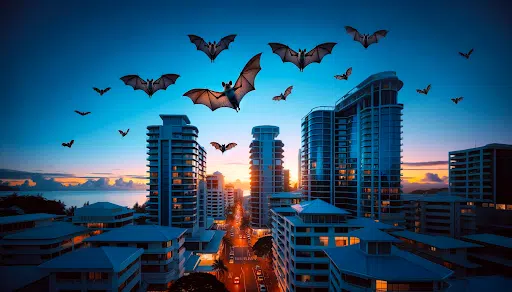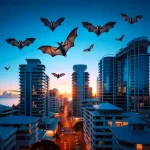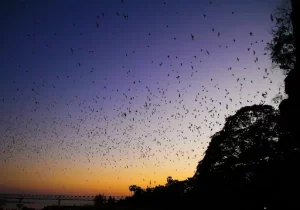 In the heart of Fiji’s capital, Suva, a mesmerizing transformation occurs as twilight descends. The city’s skies, aglow with the hues of dusk, become a canvas for a spectacular natural ballet. Here, the Pacific Flying Foxes, particularly the Fijian Flying Fox (Mirimiri acrodonta), take flight in a captivating aerial dance. This nightly spectacle, set against the painted sky, is not just a visual delight but also a symbol of the harmonious coexistence of urban development and the rich wildlife of Fiji, showcasing the island’s enchanting natural beauty.
In the heart of Fiji’s capital, Suva, a mesmerizing transformation occurs as twilight descends. The city’s skies, aglow with the hues of dusk, become a canvas for a spectacular natural ballet. Here, the Pacific Flying Foxes, particularly the Fijian Flying Fox (Mirimiri acrodonta), take flight in a captivating aerial dance. This nightly spectacle, set against the painted sky, is not just a visual delight but also a symbol of the harmonious coexistence of urban development and the rich wildlife of Fiji, showcasing the island’s enchanting natural beauty. The Flying Foxes: Nature’s Nighttime Ballet
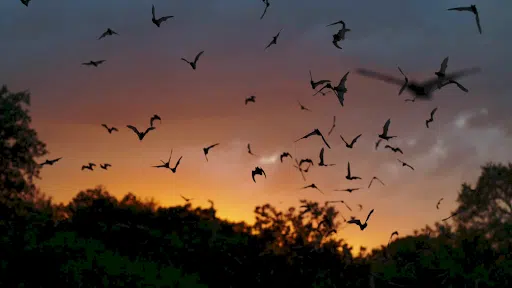
Scientific Marvel: The Fijian Flying Fox, scientifically known as Mirimiri acrodonta, is a fascinating species endemic to Fiji. Small in size, with males slightly larger than females, these bats exhibit unique features. Their fur, a blend of olive green and yellow, and bright orange eyes make them stand out in the bat world. The males are distinguished by their golden-colored fur.
Distinctive Features: The Fijian Flying Fox stands out with its bright orange eyes and olive green to yellow fur. Males often display a golden hue. These small bats, with a wingspan reaching up to 3-4 feet, present a fascinating sight as they glide through the Suva skyline.
A Glimpse into Their World: During the day, these nocturnal creatures retreat to the montane cloud forests, such as around Des Voeux Peak, roosting in epiphytic fern clumps on larger trees. Their pointed teeth suggest a diet comprising tougher plant materials, distinguishing them from other fruit bats in the region.
Adapting to Urban Life: In Suva, these flying foxes have adapted remarkably to the urban environment. They can be regularly seen flying in large numbers, weaving through the cityscape, a testament to their resilience and adaptability.
Ecological Importance and Cultural Ties
Crucial Ecosystem Roles: Bats in Fiji, especially the flying foxes, are vital for biodiversity. As pollinators and seed dispersers, they support forest regeneration and the spread of fruit-bearing plants. This ecological service is crucial for maintaining the health of Fiji’s lush landscapes.
A Symbol in Fijian Culture: Bats hold a special place in Fijian culture, seen as symbols of the natural world’s mystique and wonder. Their role in local folklore and myths underlines their importance in Fiji’s cultural heritage.
Fun Facts: Unveiling the World of Bats
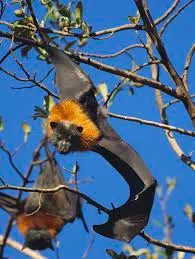 Nocturnal Life: These bats are active at night, resting during the day in unique roosting spots, often hanging upside down.
Nocturnal Life: These bats are active at night, resting during the day in unique roosting spots, often hanging upside down.- Long-Distance Flyers: Some species can cover up to 31 miles in one night in search of food.
- Echolocation: While the Fijian Flying Fox relies more on sight and smell, many bats use echolocation to navigate and find food in the dark.
- Social Behavior: Bats are social animals, forming close bonds within their groups, which is evident in their communal roosting habits.
- Longevity: Some bat species can live for more than 20 years, a remarkable lifespan for their size.
Conservation and Significance
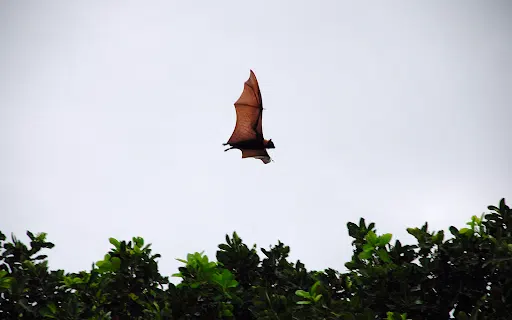
The conservation status of the Fijian Flying Fox is a matter of concern, with the species being vulnerable to extinction. Initiatives like those by NatureFiji-MareqetiViti, aimed at protecting these bats, are crucial. The involvement of local communities in these efforts highlights the cultural significance of these animals and the collective responsibility towards their preservation. Echoing the spirit of the Fijian people. Communities, especially in Taveuni, play a vital role in their sighting and conservation, reflecting a deep-rooted connection between the people and their natural heritage.
Facing Threats: The Fijian Flying Fox, confined to specific habitats like montane cloud forests, faces threats from habitat loss, climate change, and human activities. Their survival is closely tied to the health of these ecosystems.
Conservation Initiatives: Efforts led by organizations like NatureFiji-MareqetiViti are vital for protecting these unique species. Community involvement, especially in Taveuni, plays a crucial role, emphasizing a collective responsibility towards conservation and reflecting a deep connection between the people and their natural heritage.
Endangered Yet Resilient: During natural calamities, like Cyclone Harold, these bats exhibit extraordinary survival strategies. Their ability to form tight clusters in the trees to withstand strong winds, and their remarkable coping mechanisms during high winds, reflect a profound resilience that resonates with the Fijian way of life. The Fijian Flying Fox faces threats such as habitat loss and climate change. Despite these challenges, recent discoveries, like the significant bat roost in Vanua Balavu, have shed light on the species’ resilience and adaptability. This underscores the importance of continued conservation efforts to protect these unique creatures.
Cultural and Ecological Impact: The Fijian Flying Fox is integral to Fijian culture and ecology. Their role in pollination and seed dispersal is crucial for maintaining the balance of Fiji’s ecosystems. Locally, they are a symbol of nature’s resilience.
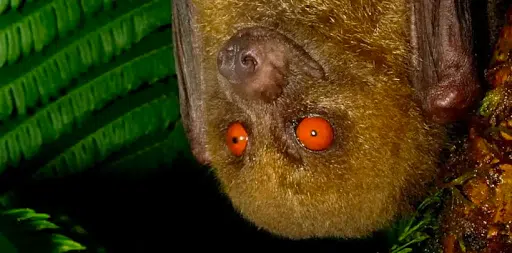
Embracing the Night: A Unique Suva Experience
For residents and visitors alike, the sight of Pacific Flying Foxes embellishing Suva’s twilight sky is an experience that transcends mere observation. It’s an invitation to appreciate the wonders of nature amidst our daily lives and a call to action for the conservation of these unique creatures that are so integral to Fiji’s ecological and cultural identity.

